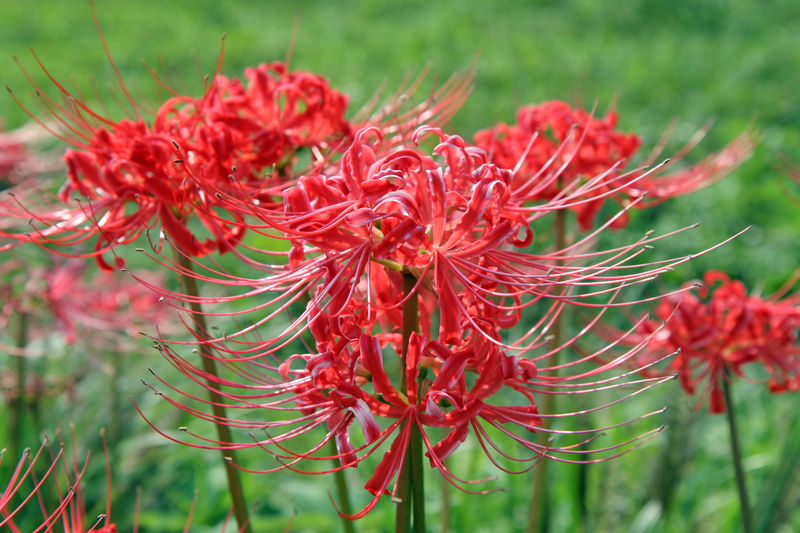Embrace peace with thoughtfully designed Zen gardens
Posted on 23/06/2025
Embrace Peace with Thoughtfully Designed Zen Gardens
In today's fast-paced world, finding a tranquil refuge from daily stress is more vital than ever. Embracing peace through thoughtfully designed Zen gardens offers an elegant solution. These serene landscapes help foster mindfulness, relaxation, and deep harmony between mind, body, and nature. Whether you have a sprawling backyard or a cozy balcony, a Zen garden can transform any space into a haven of tranquility.
Understanding the Essence of Zen Gardens
Zen gardens, or Japanese rock gardens (known as Karesansui), have been cultivated for centuries. Their minimalist layouts and symbolic elements serve as a reflection of peacefulness and spiritual contemplation. These sacred spaces are designed with intention, each element chosen for its meaning and ability to foster serenity.
The Principles Behind Zen Garden Design
- Simplicity: Emphasis on minimalism, using only necessary elements.
- Naturalness: Elements are arranged to evoke nature's effortless beauty.
- Asymmetry: Often avoids symmetrical layouts, mirroring nature's organic forms.
- Tranquility: Encourages contemplation and inner peace.
- Symbolism: Rocks, sand, and plants represent mountains, water, and the natural world.

Why Embrace Peace with Zen Garden Landscapes?
A thoughtfully designed Zen garden offers numerous mental, emotional, and aesthetic benefits. Here's why integrating a Zen garden into your environment can be life-changing:
Stress Relief and Mindfulness
Raking sand, arranging stones, or simply sitting within a Zen garden's boundaries allows the mind to slow down. These actions become meditative practices that foster presence and inner calm. Spending just a few moments daily in such a garden can significantly reduce stress and anxiety.
Harmony with Nature
Connecting with nature is one of humanity's oldest methods for grounding oneself. Zen gardens use natural forms and elements--rocks, moss, sand, gravel, water--to establish a harmonious connection. This strengthens your overall sense of well-being and encourages respect for the environment.
Enhanced Focus and Creativity
Immersing yourself in a peaceful environment enhances mental clarity. Many people find that spending time in their Zen gardens improves their creative thinking and increases their focus, making it ideal for those who work from home or seek inspiration.
Aesthetic Value
A thoughtfully designed Zen garden can significantly enhance the visual appeal of your property. With their timeless elegance and soothing color palettes, these gardens blend perfectly with any architecture--from traditional to ultra-modern homes.
Designing Your Own Zen Sanctuary: Step-by-Step Guide
Creating a peaceful Zen garden design involves careful planning and mindful selection of elements. Here's how you can craft your tranquil escape:
1. Choose the Right Location
Consider the atmosphere you wish to create. Whether indoors, outdoors, in a corner of your backyard, or even on a small balcony, ensure it's a place where you can relax undisturbed.
2. Define the Boundaries
- Use natural stone, wooden borders, or bamboo screens.
- Set clear edges to distinguish your Zen space from the rest of your garden.
3. Select Core Elements
The foundation of any Zen garden includes:
- Rocks: Symbolize mountains or islands; often arranged in odd numbers.
- Sand or Gravel: Raked into patterns emulating water or waves.
- Moss: Adds lush, calm green tones, representing stillness and age.
- Bamboo and Stones: Used for borders, fences, or minimalist sculptures.
- Water Features: Optional, but bamboo fountains or still ponds evoke peace.
4. Incorporate Symbolic Elements
Every component in a Zen landscape has significance. For example:
- Lanterns: Traditionally stone, signifying guidance and enlightenment.
- Bridges: Crossing from everyday life into peaceful contemplation.
- Plants: Ornamentals like Japanese maple, ferns, or azaleas offer subtle color and texture.
5. Master the Art of Raking
Raking patterns into sand or gravel is an essential Zen practice. Concentric circles and parallel lines can represent rippling water, flow, or tranquility. It's not only aesthetically pleasing but also an act of mindful meditation.
6. Balance Scale and Space
Every Zen garden should emphasize the importance of "ma" or empty space. Let each element have breathing room. Less is more--avoid overcrowding with too many stones or plants.
Traditional Zen Garden Features and Their Meanings
- Dry Landscape (Karesansui): No real water, instead using sand or gravel to symbolize oceans or rivers.
- Stepping Stones: Guide visitors along a mindful, intentional path.
- Zen-inspired Bridges: Connect different sections or levels, symbolizing journeys or transitions.
- Stone Lanterns ("Toro"): Provide gentle illumination and serve as spiritual markers.
- Moss: Represents lasting endurance and the passage of time.
Zen Garden Variations: Find the Right Style for You
Not all Zen gardens are identical--there's room for personal expression within these peaceful designs. Explore these popular variations:
Karesansui (Dry Rock Gardens)
Famous for their raked gravel and carefully placed rocks, these gardens are both minimalist and highly symbolic.
Tsubo-niwa (Courtyard Gardens)
Ideal for urban settings or small spaces, these intimate Zen gardens focus on providing a natural view from inside the house.
Roji (Tea Gardens)
Created as a pathway to the traditional tea house, Roji gardens emphasize simplicity and the anticipation of calm through ritual.
Moss Gardens
A lush, green variation focusing on soft moss and minimal rocks, inspiring serenity and stillness.
Cultivating Stillness: Daily Practices with Your Zen Garden
To truly embrace peace with a thoughtfully designed Zen garden, spend time there regularly. Here are some calming routines you can incorporate:
- Meditation: Sit quietly, observe the garden, and focus on your breath.
- Sand Raking: Practice mindfulness through the gentle, repetitive motion of raking.
- Journaling: Reflect on your thoughts as you absorb your surroundings.
- Tea Ritual: Enjoy a mindful cup of tea in your garden, focusing on the present moment.
- Evening Strolls: Take slow walks through your garden at dusk to decompress after a busy day.
Choosing Plants for Your Serene Zen Garden Design
While classic Zen gardens are minimalist in greenery, carefully selected plants can enhance the ambiance. Consider these options:
- Moss: Provides softness and a sense of age.
- Japanese Maple: Colorful leaves that change with the seasons.
- Bamboo: Adds height and a sense of privacy.
- Ferns: Lush, shade-loving foliage for depth.
- Azaleas: Delicate blossoms in springtime.
- Pine Trees: Symbolize longevity and resilience.
Pro Tip: Use native plants to ensure your Zen garden thrives with minimal maintenance.
Indoor Zen Gardens: Peaceful Retreats at Home
Don't have an outdoor space? No problem! Miniature Zen gardens can be created inside with tabletop versions that include a shallow tray, sand, small stones, and a tiny rake. These compact gardens are perfect for desks or meditation corners, offering a bite-sized moment of peace anywhere in your home.
Maintenance Tips for Lasting Tranquility
A Zen garden is designed for easy care, allowing you to focus on peace rather than constant gardening. Follow these maintenance suggestions:
- Regular Raking: Keep sand and gravel patterns crisp for visual interest and mindfulness practice.
- Weeding: Remove unwanted plants to maintain clarity and order.
- Stone Arrangements: Occasionally check rocks and replace or reposition as needed for balance.
- Pruning: Trim moss or shrubs to preserve the minimalistic look.
- Cleaning Water Features: Prevent algae buildup in ponds or fountains.

Frequently Asked Questions About Zen Gardens
How much space is needed for a Zen garden?
Zen gardens are highly adaptable. You can create a peaceful, thoughtfully designed Zen garden in a large yard or in just a small corner of your home or balcony.
Can I customize my Zen garden?
Absolutely! While it's essential to respect traditional principles, feel free to incorporate meaningful elements, favorite plants, or unique decorative items that resonate with you.
Do Zen gardens require a lot of maintenance?
One of the joys of Zen gardens is their low-maintenance nature. With occasional raking, weeding, and tidying, your space will remain inviting and peaceful all year round.
Are water features necessary?
Not at all. Zen gardens traditionally use sand or gravel to symbolize water, but you can add a small pond or bamboo fountain if you enjoy the sound of running water.
Is a Zen garden suitable for meditation?
Yes! Zen gardens are perfect spots for meditation, relaxation, and cultivating mindfulness in daily life.
Conclusion: Embrace Peace with Thoughtfully Designed Zen Gardens
In an age of relentless distractions, creating a serene sanctuary at home can make all the difference. Embrace peace with a thoughtfully designed Zen garden to reconnect with yourself, reduce stress, and find inspiration in nature's simplest forms. Whether outdoors or indoors, large or small, a Zen garden invites you to slow down, breathe deeply, and savor the beauty of mindful living.
Start your Zen journey today and discover the transformative power of tranquility in your own beautifully curated oasis.
- Related Keywords: Zen garden design, peaceful Zen landscapes, create a Zen sanctuary, tranquil Japanese gardens, minimalist garden design
Latest Posts
Navigating the Complexities of Windy Gardening
Ensuring a Safe Garden for Canine Adventures
Discover How Container Gardening Can Transform Your Home
Navigating Winter: Tips for Protecting Your Garden Plants
Create Serenity with These 5 Low Maintenance Budget Garden Concepts

